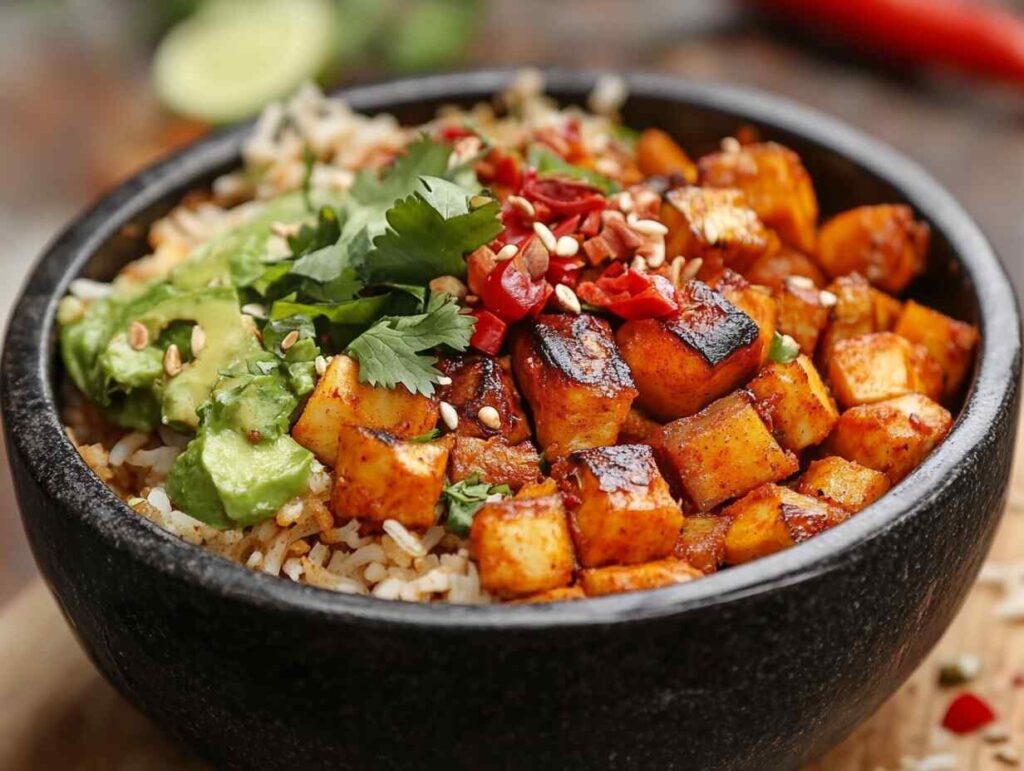What is Vegan Biryani?
Biryani is a fragrant, mixed rice dish originating from South Asia, cherished in countries like India, Pakistan, and Bangladesh. Traditionally, biryani includes layers of basmati rice, marinated meat, and an array of vibrant spices. However, vegan biryani reimagines this classic dish by swapping animal-based ingredients with plant-based alternatives while retaining its signature flavors.
Instead of meat, vegan biryani incorporates vegetables, legumes like chickpeas, or even tofu for protein. The rich layers of spices, such as cumin, garam masala, and turmeric, remain at the heart of the dish, ensuring every bite bursts with flavor.
Why Choose Vegan Biryani ?
Switching to vegan biryani isn’t just a culinary choice—it’s a conscious lifestyle decision. For one, it’s kinder to the planet. Did you know that plant-based meals significantly reduce your carbon footprint? Besides being eco-friendly, vegan biryani is a nutrient-packed dish loaded with vitamins, minerals, and plant-based protein.
Moreover, it’s a great way to embrace the rich flavors of South Asian cuisine without compromising on health or ethics. Whether you’re looking for a comforting family dinner or a crowd-pleasing dish for gatherings, vegan biryani ticks all the boxes.
Ingredients in Vegan Biryani
Core Ingredients for Authentic Flavor

The magic of vegan biryani lies in its ingredients, which bring depth, aroma, and color to the dish. Basmati rice is the undisputed hero, known for its long grains and delicate fragrance. It’s essential to rinse the rice thoroughly before cooking to remove excess starch and achieve that perfect fluffy texture.
Aromatic spices such as cumin, turmeric, and garam masala infuse the dish with authentic South Asian flavors. These spices not only elevate the taste but also contribute to the vibrant yellow-orange hue that biryani is famous for. Don’t forget saffron or its more affordable alternative, turmeric, to add an extra touch of elegance.
Vegetables That Shine in Biryani
Fresh, colorful vegetables are at the heart of any vegan biryani. Popular choices include carrots, cauliflower, peas, and potatoes, but you can mix and match based on seasonality. Sweet potatoes or zucchini can add a unique twist. These vegetables soak up the spices, creating a delightful blend of flavors in every bite.
Vegan Alternatives for Traditional Ingredients
Traditional biryani often calls for yogurt, but vegan versions can use coconut yogurt or almond yogurt for the same creamy tanginess. For protein, chickpeas, tofu, or even lentils are excellent additions. These substitutes ensure the dish remains nutrient-packed without compromising its texture or flavor.
For tips on selecting the best vegetables for Indian dishes, you might find the guide on Vegan Biryani Best Vegan Bite helpful.
How to Cook Vegan Biryani: Step-by-Step Guide
Preparation Phase

Before diving into the cooking process, set yourself up for success by preparing all the ingredients. Rinse the rice and chop the vegetables into uniform pieces for even cooking. Mix the spices in a small bowl for quick access during cooking. This preparation stage ensures a smoother, more enjoyable cooking experience.
Cooking the Base
Start by heating oil in a deep pan and sautéing onions, ginger, and garlic until fragrant. These aromatics form the foundation of the dish. Add the spice mixture and toast it gently to release its full aroma. Then, introduce the chopped vegetables, allowing them to soak up the spices.
Building Layers of Flavor
Once the vegetables are coated in spices, add the rinsed rice, vegetable broth, and a touch of saffron or turmeric-infused water. Cover the pan with a lid and let everything simmer. The rice will absorb the flavorful broth, and the spices will penetrate the vegetables.
Serving Suggestions
When the biryani is ready, fluff the rice gently with a fork. Serve it hot, garnished with fresh cilantro, almonds, or raisins for added texture and flavor. Pairing the dish with vegan naan or raita makes for an authentic and satisfying meal.
without sacrificing flavor or satisfaction. Here are the key health benefits of this vibrant dish.
Regional Variations of Vegan Biryani
Hyderabadi Vegan Biryani
One of the most famous biryani styles, Hyderabadi biryani, is known for its rich and bold flavors. Traditionally cooked using the “dum” method (slow cooking with sealed steam), this version can be veganized by swapping meat with tofu, cauliflower, or jackfruit. The use of saffron, caramelized onions, and fresh mint ensures that this dish retains its authentic essence. Pair it with vegan raita to balance the bold spices.
South Indian Vegetable Biryani
South Indian biryani offers a coconut-infused twist, making it unique. Ingredients like curry leaves, mustard seeds, and fresh coconut milk add depth to the dish. Vegetables such as carrots, beans, and bell peppers shine in this variation. South Indian biryani is often served with tangy pickles or papadums for a delightful contrast of textures.
Global Adaptations of Vegan Biryani
Outside South Asia, vegan biryani has taken on creative global twists. In the Middle East, versions with dried fruits like dates and apricots are common. Western adaptations might incorporate quinoa or brown rice for a healthier take. These adaptations prove that vegan biryani is as versatile as it is delicious.
For a step-by-step recipe of a similar dish, you can explore Vegan Instant Pot Recipes for Food Lovers.
Tips for Perfect Vegan Biryani Every Time
Avoiding Common Mistakes
Making vegan biryani can seem daunting, but avoiding a few common mistakes ensures your dish turns out beautifully.
First, don’t overcook the rice. Properly rinsing and soaking basmati rice helps it cook evenly and prevents clumping. Second, don’t skimp on spices. Biryani’s signature flavor comes from its rich spice blend, so use fresh, high-quality spices for the best results. Lastly, avoid undercooking or overcrowding vegetables. Sauté them lightly before layering to ensure they retain some texture during cooking.
Optimizing Flavor
To elevate your vegan biryani, layer flavors strategically. Toasting spices like cumin and coriander in oil releases their natural oils, enhancing their aroma. Adding fresh herbs like mint and cilantro during the final stage gives the dish a fresh and vibrant finish.
Another tip is to drizzle a little saffron-infused water over the top layer of rice before cooking. This adds not just a beautiful color but also an unmistakable floral aroma. Finally, serving your biryani with side dishes like vegan raita or pickle complements its bold flavors perfectly.
For more tips on cooking vegan meals, check out The Ultimate Guide to Vegan Marinade Recipes.
Nutritional Benefits of Vegan Biryani
Key Nutrients from Ingredients
Vegan biryani is a nutritional powerhouse thanks to its combination of wholesome ingredients. The basmati rice provides a steady source of energy through complex carbohydrates, while vegetables like carrots, cauliflower, and peas are packed with essential vitamins and minerals, such as vitamin C, potassium, and folate.
For plant-based protein, ingredients like chickpeas and tofu play a vital role. Chickpeas are rich in fiber and iron, making them a great addition to this dish. Additionally, spices like turmeric and ginger offer anti-inflammatory properties, boosting your immune system while enhancing the flavor.
Low-Fat and Cholesterol-Free Advantage
Unlike traditional biryani that relies on ghee and cream, vegan biryani is naturally low in saturated fats and completely cholesterol-free. This makes it a heart-healthy option that doesn’t compromise on taste. Using minimal oil and nutrient-dense ingredients ensures the dish is both light and satisfying.
Creative Variations and Pairings
Experimenting with Flavors
One of the joys of making vegan biryani is how adaptable it is. For a sweeter twist, try adding raisins, dried apricots, or even pineapple chunks to balance the spices with a hint of sweetness. If you prefer a spicier version, increase the amount of cayenne pepper or add finely chopped green chilies.
Grains like quinoa or millet can replace basmati rice for a high-protein alternative. For a smoky, barbecue-inspired flavor, consider roasting the vegetables before mixing them with the rice and spices. These small tweaks can transform your biryani into something entirely unique.
Complementary Dishes
Pairing vegan biryani with the right side dishes takes it to the next level. Serve it with vegan raita made from almond yogurt, cucumber, and fresh mint to cool down the spice. Add a tangy element with Indian-style pickles or a fresh green salad.
For a complete meal, consider adding other vegan Indian dishes like dal tadka or vegetable korma. These creamy, spiced sides pair beautifully with the bold, layered flavors of biryani.
For more inspiration on complementary recipes, explore the Vegan Indian Dinner Recipes section on VegFaveBite.
FAQs about Vegan Biryani
Can Vegans Eat Biryani?
Absolutely! Biryani can easily be made vegan by replacing meat and dairy with plant-based alternatives. With ingredients like tofu, chickpeas, and vegan yogurt, you can enjoy the same rich flavors without animal products.
What is Biryani Without Meat Called?
Biryani without meat is often called vegetable biryani. However, the term “vegan biryani” specifically refers to versions that exclude all animal-based ingredients, including ghee and yogurt.
What is a Vegan Substitute for Yogurt in Biryani?
The best substitutes for yogurt in biryani are coconut yogurt, almond yogurt, or cashew cream. These options replicate the creaminess and slight tang that yogurt provides while keeping the dish entirely plant-based.
Can Biryani Be Made Without Meat?
Of course! Biryani without meat can be just as flavorful. By using spices, vegetables, and plant-based proteins, you can create a dish that’s every bit as satisfying.

